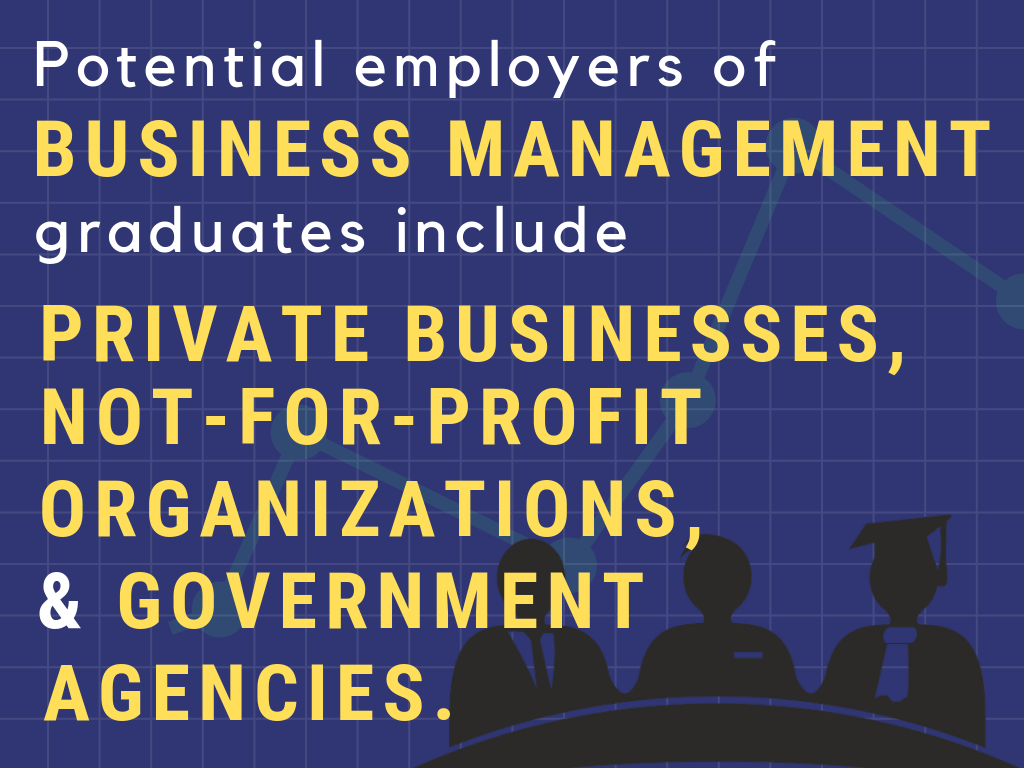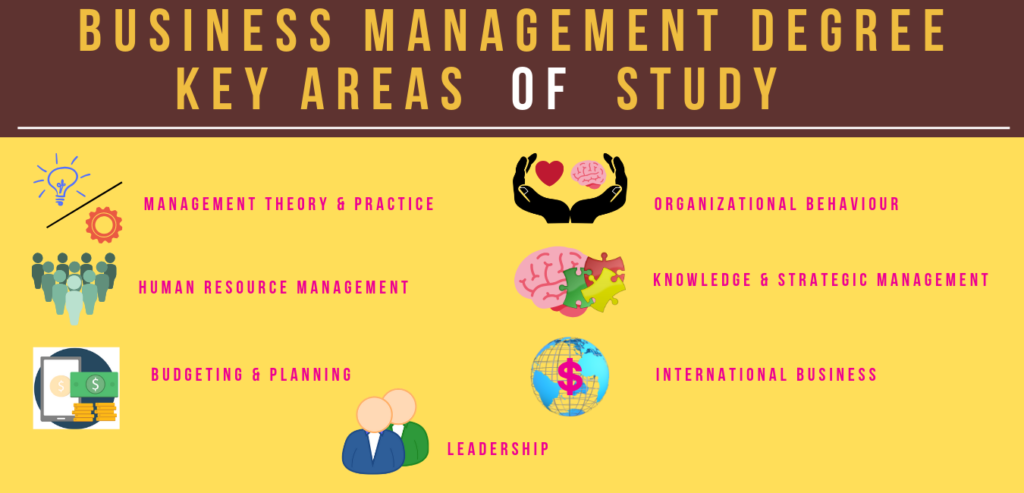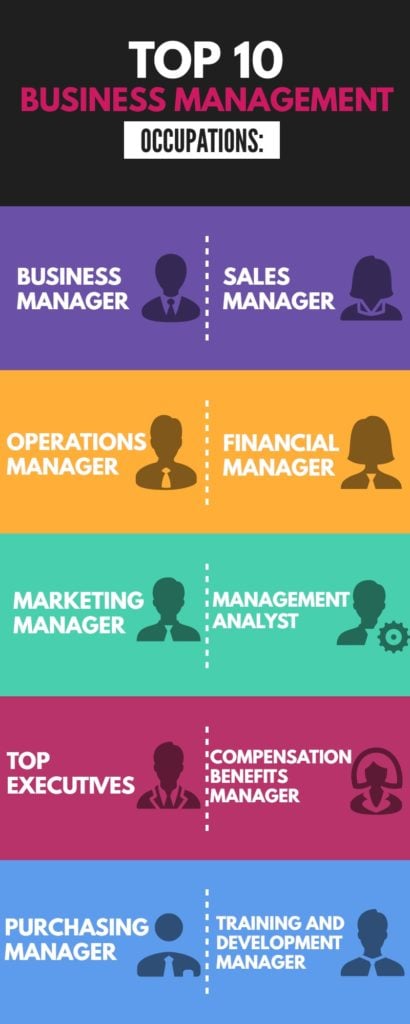The Ultimate Business Management Career Guide

Find your perfect college degree
It is necessary for all sorts of business structures, big or small, to have competent managers. These managers play an essential role in the sustainability and profitability of an organization. Whether you are a high school graduate or an entrepreneur, pursuing a business management degree is worthwhile.
The knowledge and skills obtained while earning this degree through either traditional or online schools can go a long way in almost any industry. We hope that this Business Management Career Guide will answer many of your business-related career questions!
Students who embark on the journey to becoming capable business managers in their interest can do it through different types of specializations offered by various schools. These specializations enable the students to customize their studies and help them get to know the right field for them.

They get exposed to different business theories and gain competence in the areas of leadership, legal business, marketing, human resources, and more. There are hundreds of schools that offer multifaceted business management degree programs. What you learn in the classroom will help you explore your areas of strength.
Are you a people person with high regard for leadership roles? Do you take the lead and possess leadership qualities? Do you plan to start your own business? Business Management may be the right program for you!
Business Management as a Degree
Business Management is one of the most popular majors among all academic degree programs. This degree program encompasses a wide range of specializations and career tracks.
A business management major can help you prepare for a wide variety of roles in any industry. According to NCES.ed.gov, there were 372,000 total business degrees awarded in recent years.
Locations with the highest number of degree recipients are West Frankfort, IL, Schaumburg, IL, and Dayton, TN, and places with the highest concentration of degree recipients are Tempe, AZ, New York, NY, and San Diego, CA.
The education you’ll obtain from learning Business Management will equip you with necessary management procedures and tasks, as well as fundamental management skills applicable to almost all sorts of career fields.
Types of Business Management Degrees
An Associate’s in Business Management is the basic level of degree one can earn in two years. It provides a foundation of business theory and skills needed for business operations. Typically, this degree requires 60-70 credits to finish.
Some of the courses required are Principles of Marketing, Introduction to Business, Financial Accounting, Business Law, Business Ethics, and Introduction to Human Resources. Depending on the institution, some associate degree programs are offered with specializations in Marketing, Operations, or Finance.
A Bachelor’s in Business Management takes four years for full-time students to complete. This degree emphasizes that students gain a foundation in the aspects of the business world. Its major requirements include Accounting, Management Information Systems, Leadership and Ethics, Human Resource Management, Marketing, and Economic Principles.
Courses must reach 120 to 124 credit hours for most schools, and an internship or research project is necessary.

A Master’s in Business Management helps students develop expertise in Business Management after completing a bachelor’s program. Pursuing this degree usually takes two to three years with full-time study.
Core courses include Strategic Planning and Marketing, Operations and Project Management, Managerial Statistics, International Management, and Human Resource Management.
A capstone research project or a master’s thesis project is also required. While there are schools that offer master’s in business management, most institutions offer business management programs through MBA or Master’s in Business Administration. This degree requires 30 to 60 credit hours.
The Doctorate in Business Management degree is the highest level of education for a Business Management program after a master’s degree. Students may choose to enroll in a Ph.D. program in Management or a DBA (Doctorate in Business Administration), which typically takes 3-5 years to complete.
The first two years are spent on coursework like Organizational Analysis and Behavior, Introduction to Research Methods, Probability Theory, and Applied Behavioral Research, to name a few. The faculty then helps or works with the students to initiate research.
Students have to complete data analysis for their dissertation at the beginning of the third year and independently continue research for the rest of the term.
Business Management Specializations
The broad range of career options for business management graduates makes it the very reason why most institutions offer specializations for every business management degree level. Here are some of the specializations of business management, but are not limited to:
Accounting
Accounting focuses on the study of public accounting and the examination of tax accounting, auditing, and financial and managerial problems. This specialization is designed for business students who do not hold an accounting degree but want to explore careers in the accounting field.
Some of the courses may include Auditing, Financial Accounting, Cost Accounting, and Corporate Taxation.
Managerial Accounting
Managerial Accounting students may sit for the CPA examination depending on the courses offered by the school.
Finance
Finance allows students to learn financial analysis by collecting financial information and preparing recommendations for financial and investing decisions.
Courses in this specialization may comprise relevant areas in finance like Financial Management, Investment and Portfolio Management, Risk Management, and Financial Modeling. Students also explore techniques for creating financial forecasts, and international finance, and solve business issues by using principles of finance and accounting.

Marketing
Marketing is designed to provide students with essential skills and knowledge in strategic planning, marketing research and analysis, product policies, marketing organization, and other marketing-related topics.
It emphasizes the importance of creativity and strong analytical skills. Students explore courses in Retail Management, Sales Management, Advertising Management, Marketing Strategy, and Marketing Research.
Economics
Economics enhances students’ views and a solid understanding of the macroeconomic and microeconomic variables. It also allows students to learn and develop an intensive analysis of economies using statistical tools and data from the business environment.
This specialization strengthens the correlation between economics and finance. Generally, coursework in International Economics, Financial Institutions & Markets, Managerial Economics, and Market Structure is required for this specialization.
Entrepreneurship & Innovation Management
Entrepreneurship & Innovation Management focuses on entrepreneurship in high technology ventures, the development of new business opportunities, and the leadership skills necessary to deal with the challenges of innovation.
Courses covered are New Ventures Financing, Social Entrepreneurship, Venture Capital and Banking, and Venture Capital & Private Equity. This specialization is perfect for students who either want to start their enterprise or enhance their leadership or managerial skills for an existing business.
Human Resource Management
Human Resource Management lets students learn more about the selection process of business personnel, the application of foundational human resource skills, and the management of talent or employees. This specialization is excellent for students who want to focus on people-centered leadership.
Human Resource Management, Compensation Administration, Current Issues in Human Resource Management, Human Resource Technology Management, Leadership, Training and Development, and Strategic Staffing are required to pursue this concentration.
Management Information Systems
Management Information Systems addresses the management of the use and impact of information systems in organizations.
With the fast-changing world of business, globalization and information systems have now played a more critical role. This specialization is ideal for students who are interested in the cutting-edge technology that modern companies use in business decisions.
Courses help students focus on digital business transformation through data and techniques that help in managerial decisions.
These courses include Research Methods in Information Systems, Introduction to Behavioral Research Methods for Business, Business Systems Analysis, Telecommunications & Networking Concepts, and Database Management Systems.
Operations Management
Operations Management focuses on topics like production control, quality management, supply chain management, quality control, and development of goods and services. Students are equipped with the business intelligence and practical problem-solving skills necessary for managing organizations.
These are achieved through taking courses like Foundations of Operations Management Research, Operations Management & Quantitative Techniques, Project Procurement Management, Topics in Inventory Management, and Stochastic Models for Research in Business and Management.
International Business
International Business delves into business management topics that cover international marketing, finance, economics, and organizational management. Courses in this specialization will help students broaden their understanding of business management across borders and cultural boundaries.
Some of the courses offered for this concentration may cover Global Comparative Management, International Economics, International Business, International Marketing, International Entrepreneurship, and International Business Law.
Project Management
Project Management undertakes specific projects and tackles different techniques and strategies for all aspects of its completion. Students learn how to manage diverse teams, complete projects on time and on budget, and utilize appropriate methodologies in directing the success of business projects.
A student may take courses like Foundation of Project Management, Project Procurement Management, Project Management Strategy, Advanced Topics in Communications for Project Management, and Program and Project Portfolio Management.
Online vs. Brick and Mortar Business Management Degrees
As the evolution of online learning continues to expand, prospective students should look for and enroll in accredited institutions.
While brick-and-mortar business management degrees are still present, an online format offers equivalent courses, so nontraditional, continuing, and adult learners experience and learn the same quality of education as the traditional form.
Brick-and-mortar business management degrees give a classroom environment where you can directly interact with the faculty/professors and peers. Several student activities are in front of you for you to choose from.
The online version helps anyone who wants to have the college experience while not being on campus at all. The ultimate challenge of being an online student of a business management degree program is the ability and consistency to manage your own time, follow course schedules, and meet deadlines at your own pace.
Online students can work and study at the same time. Classes are guided by their respective advisers, and online participation is done through live video conferences. Also, schools ensure online students are provided with technical support and are ready to assist them anytime.
Students (of brick and mortar Business Management degree) only leverage against online format is the opportunity to interact with students vis-à-vis, which is essential in honing interpersonal and communication skills in the business industry.
Financing Your Business Management Education
The cost of earning a Business Management degree depends on the level of education you want to pursue. One significant factor that determines tuition rates is the student’s residency. Nowadays, there is no escaping from the fact that college tuition is expensive.
According to Data USA, the median out-of-state private tuition for a business degree is $27,220, while the median in-state public tuition is $6,330. But, before you decide to keep from getting into college because of its cost, know that there is about $130 billion available for Federal student aid for the fiscal year 2019 (as per the Department of Education).
This includes $30 billion in Pell Grants and $99 billion in student loans. An estimate of over 11 million students can take advantage of these financial aid resources.
There are two types of financial aid: merit-based aid and need-based aid. Merit-based aid is awarded to students by a third-party organization or the institution itself based on their merits and not based on their financial needs.
Need-based aid is for students whose family or one’s income and contribution couldn’t cover the total college cost.
Scholarships, grants, loans, and work-study are other types of aid. Scholarships, which do not require repayment, are awarded by individual institutions and private organizations. Like scholarships, grants do not require repayment.
Grants, on the other hand, are offered by the federal and state governments and other service institutions. The federal government offers the Federal Pell Grant, Federal Supplemental Education Opportunity Grant (FSEOG), Teacher Education Assistance for College and Higher Education (TEACH) Grant, and Iraq and Afghanistan Service Grant.
Federal and state governments also offer loans that must be repaid with interest. Another type of funding is private loans, which are provided by banks.
Lastly, the work-study program is for students who can work in federally funded jobs while enrolled in college courses. Most schools let you explore your financial options and provide the necessary application information for financial aid.
Business Management Career Pathways, Information, and Outlook
Graduates of business management degree programs leave the school prepared to join the workforce in a variety of industries. As reported by the Bureau of Labor and Statistics, Business Management degree holders can fill the following positions:
- Accountants and Auditors examine financial statements and compute taxes, prepare tax returns, and ensure taxes are paid on time. They inspect accounting books and systems, ensuring they comply with laws and regulations.
The demand for accountants and auditors is expected to grow by 4% until 2032. Median pay is $78,000 per year.
- Administrative Services Managers oversee the maintenance needs, and facilities management, and handle the acquisition, distribution, and inventory of equipment and supplies. They also supervise building operations, planning and management, communication, and facility functions.
Employment for administrative services managers is likely to grow 5% up to the year 2032. The annual median pay for this occupation is $101,870.
- Advertising, Promotions, and Marketing Managers analyze the demand for products and services and direct business strategy for advertising. Their goal is to create an interest or influence consumers to purchase products and services of a department or an organization.
These managers have to oversee that the campaign or advertising budget and materials are estimated and evaluated. The annual wage for advertising and promotions managers is $127,830 while marketing managers earn $140,040 yearly. Employment in this field of occupation is expected to grow 6% in the coming years.
- Compensation and Benefits Managers are responsible for monitoring and implementing the compensation and benefits for the company. They have to oversee salary structure, merit increases, insurance, and pension plans and devise appropriate base pay for every job position in the company.
The job outlook for compensation and benefits managers is expected to grow 2% within the next few years, which is about as fast as the average for all occupations. They are paid $131,280 annually.
- Financial Managers execute a solid business plan for the company by overseeing financial reports and investments, developing strategies, and advising senior executives in making long-term and short-term decisions for the company.
They look after the overall financial health of the company and have to stay up-to-date on new technological software and advances useful in the improvement and maintenance of the company’s financial reports and operations.
The projection for financial managers’ employment will be at 16% until the year 2032. This is much faster than the average for all occupations. Median pay is $139,790 per year.
- Financial Analysts primarily work for financial managers. Financial analyst duties and responsibilities usually overlap with those of the business managers, but the latter has to call for the final decision-making.
Financial analysts collect, monitor, and study data to analyze the financial status of the company. Making comparative and cost analyses through operational data is one of the essential duties of financial analysts.
There is an 8% projected growth in the next seven years for employment, and the median annual salary is $96,220.
- Human Resources Managers ensure the Human Resources department or team carries out its functions and tasks. They plan, organize, and control activities in the department.
Developing and analyzing the company’s evaluation program, maintaining the company’s handbook on policies and procedures, and overseeing recruitment, new employee orientations, and employee relations counseling are some of the duties of human resource managers.
The projected growth rate for the employment of human resource managers is 5%, and the median yearly salary is $130,000.
- Industrial Production Managers ensure that the production processes and activities run smoothly. They also supervise reducing production costs when necessary, decide which machine and equipment to utilize in the production, and monitor, schedule, and anticipate problems of production.
Their duties require regular contact with employees and partners in the production or supply chain. The median wage for industrial production managers is $107,560 per year.
- Market Research Analysts mainly study market conditions and examine potential sales of products and services. They create visuals of market trends and present studies to clients or marketing management. They are typically hired by the public or private sectors to make recommendations.
A much faster growth of 13%, more than the average for all occupations, is expected for market research analysts. Median annual wage is $68,230.
- Project Managers are the point persons for a particular project of an organization. Project managers plan, monitor, and report on the project while acting as the intermediary between the upper management and the operations team that executes the project.
Time management, documentation, issues, and risk management are some of the responsibilities of a project manager.
- Public Relations Managers oversee the creation of media content, strategy, and releases of an organization’s public relations. They maintain and forge relationships with media men, journalists, and influencers in any business sector, whether for-profit or non-profit.
They also manage and brief press officers and organize press conferences. Public relations managers’ employment growth is at 6%, and the median pay is $125,620 per year.
- Sales Managers typically lead a group of sales professionals or directly, a sales team. They supervise the organization by directing and setting goals, training and motivating sales team members, working with customer complaints, analyzing data and records about sales trends, and devising strategies for expanding the client or customer base.
Employment growth is projected at 4%, and the median annual wage is $130,600.
- Tax Examiners, Collectors, and Revenue Agents are responsible for checking federal, state, and local taxes that an individual or an organization owes. Reviewing tax returns, tax audits, and tax payments and recognizing tax fraud are included in their duties.
The median annual wage for tax examiners, collectors, and revenue agents is $57,950.
- Top Executives are the authoritative leaders responsible for managing the overall operational activities and overseeing the organization’s budgetary operations. They also work with other senior management positions in establishing departmental goals, procedures, and policies.
The projection of growth for top executives is 3% up until 2032. Median pay is $100,090 per year.
- Training and Development Managers ensure every employee in the organization is well-trained and does their job effectively and efficiently. They help design and develop training schemes to enhance the knowledge and skills of officers, employees, and newly hired members of the organization.
Employment for training and development managers is forecasted to grow by 6% within the next seven years. Their annual wage is $120,000.
Top 10 Business Management Occupations

Business Manager
An indispensable part of any business, big or small, business managers are responsible for overseeing and supervising a company. They manage the day-to-day operations of a business or organization. Their specific tasks include administrative services, human resources, policies and procedures, and accounts.
It is the business manager’s job to direct the activities of workers as well as ensure that every department is on track to meet its financial goals.
Salary: $87,972
Entry-level Education: Bachelor’s degree
Sales Manager
The head of the sales department or team and sales managers have to set sales goals and how to achieve them. They develop training programs and work strategies that can help improve the sales teams’ records.
Salary: $130,600
Entry-level Education: Bachelor’s degree
Operations Manager
Operations managers oversee the different operations in the company. They are responsible for managing the daily operations of an office, department, or company through formulating and implementing policies as well as directing particular projects. Their job is similar to that of the business managers.
However, the responsibilities of operations managers are confined to the processes and production aspects alone. They have more specific tasks, like increasing the efficiency of the production machine of the company.
Salary: $123,030
Entry-level Education: Bachelor’s degree
Financial Manager
The role of a financial manager is to oversee the financial health of an organization. Their tasks include preparing financial reports, directing investment activities, and developing strategies and plans for their company’s long-term goals.
Salary: $139,790
Entry-level Education: Bachelor’s degree
Marketing Manager
To spark the audience’s interest in products and services, marketing managers are needed in any business or organization. Their duties extend to advertising, promoting, and marketing their offerings by planning programs that can foster awareness and trust in their brands.
They usually coordinate with art directors, sales agents, and financial staff members.
Salary: $138,730
Entry-level Education: Bachelor’s degree
Management Analyst
Often referred to as management consultants, management analysts are the ones responsible for proposing ways to improve their organization’s efficiency. It is their job to advise managers on how to make organizations more profitable. This advice often leads to reduced costs and revenue growth.
Salary: $95,290
Entry-level Education: Bachelor’s degree
Top Executives
Top executives are needed to devise strategies and policies that will help the organization meet its goals. They plan, direct, and coordinate operational activities within the company.
Salary: $100,090
Entry-level Education: Bachelor’s degree
Compensation and Benefits Manager
It is the job of the compensation and benefits manager to plan, develop, and supervise programs that will compensate employees. They set the pay and benefits structure and determine competitive wage rates for various compensation plans.
It is also their responsibility to prepare a program budget and make sure that it stays within the budget.
Salary: $131,280
Entry-level Education: Bachelor’s degree
Purchasing Manager
The duties of purchasing managers include overseeing the work of buyers and purchasing agents. They are responsible for buying products that the business will either use or resell to the customers. Their tasks extend to negotiating contracts with suppliers.
Salary: $75,120
Entry-level Education: Bachelor’s degree
Training and Development Manager
In every business or organization, it is vital to plan, direct, and coordinate programs that can enhance the knowledge and skills of employees. This will help the latter become more productive and play an essential role in achieving the company’s goals.
Salary: $120,000
Entry-level Education: Bachelor’s degree
Other Business Management Occupational Titles:

Part-time Business Management Jobs

Teacher Assistant
Some schools hire Teacher Assistants to help teachers reinforce lessons by reviewing materials with students one-on-one or in groups. Teacher assistants are also known as teacher aides, paraprofessionals, and education assistants.
Teacher Assistant Salary: $30,920
Assistant Managers
The most part-time assistant manager supports the manager with daily store operations. They also assume the manager’s duties in his/her absence. Sometimes, assistant managers help out in responding to customer queries.
Most of the time, they set out to accomplish tasks assigned by the manager in an accurate and timely manner. This includes delegating daily workload to employees and ensuring shelves are stacked with new merchandise.
Assistant Manager Salary: $35,506
Retail Sales Associates
Retail sales associates ensure that retail stores are operational. They assist with customers’ queries and sales. Sometimes, they are also requested to take charge of restocking inventory and operating the cash register, if necessary.
Retail Sales Associates Salary: $30,750
Management Analyst
Most management analysts can find part-time work in firms that need someone to improve their operations, maximize profits, and increase efficiency.
They are the ones who talk to vendors, executives, and clients to examine the strengths and weaknesses of the business and help the decision-makers improve the situation.
Management Analyst Salary: $95,290
Budget Analyst
Budget analysts are integral in developing an operational budget and evaluating spending practices. Some small firms hire part-time budget analysts to consult with managers and decide on necessary funding. They are tasked to compile this data into a comprehensive budgetary plan.
Budget Analyst Salary: $82,260
10 Unique Business Management Careers
Real Estate Appraiser
Business Management graduates can find an unusual yet satisfying job in appraising properties. Their business and people skills can be put to good use in this kind of situation, allowing them to prepare reports on a commercial or residential property’s value.
Real Estate Appraiser Salary: $61,560
Contract Negotiator
In this job, contract negotiators serve as the mediator between two businesses. They help design contracts that are agreeable to both parties. While some companies employ in-house negotiators, many businesses also choose freelance consultants who can help them draft contracts.
Contract Negotiator Salary: $97,029
Credit Counselor
Through their negotiation and communication skills, credit counselors work with clients to sort out their financial issues. Their job entails gathering information to assess the financial situation and determine an individual’s ability to pay creditors.
They help in negotiating debt with creditors, set up repayment plans, lower interest rates, and negotiate late fees.
Credit Counselor Salary: $50,230
Market Research Analyst
It is the market research analysts’ job to study the latest products on the market and help companies determine which ones will be successful. They also establish the kind of buyers for the products and set the market prices.
Market Research Analyst Salary: $68,230
E-commerce Web Developer
Most business management graduates may not expect to find a job as a web developer, but if they have coding and graphic design experience, they can combine it with their business management skills to create and maintain an excellent e-commerce site.
Their developer skills can build upon their business prowess to give them a definitive edge over many competitors.
E-commerce Web Developer Salary: $80,730
Event Manager
If one does not feel like managing a business, managing an event is the next best thing. It is also exciting, especially for those who have social skills. Event managers are responsible for planning events, parties, and company meetings.
Event Manager Salary: $52,560
Public Relations Specialist
Most companies hire public relations specialists to help them plan public events, schedule interviews, and improve their public image. They serve as the liaison between the employer and clients or the public. Often they work in the healthcare industry.
They are responsible for establishing a good relationship with news media, consumers, local communities, and even the government.
Public Relations Specialist Salary: $67,440
Loan Officer
Loan officers help clients deal with financial milestones like paying for a college education or buying a new house. They can find positions in a variety of settings, from commercial banks and credit unions to mortgage companies and car dealerships.
The best loan officers have excellent interpersonal skills and know how to advise, evaluate, and authorize loans to people and businesses.
Loan Officer Salary: $65,740
Fundraiser
Commonly employed in nonprofit organizations like educational institutions and health research foundations, fundraisers are tasked to bring in money by making cold calls, writing grants, and organizing fundraising events.
Fundraiser Salary: $61,190
Social Media Manager
Business management graduates who have mastered the use of digital technology can find many job opportunities in the digital marketing field.
With their background in marketing, they will be able to help increase brand awareness among consumers through the use of social media channels like Facebook, Twitter, and Instagram. They should be able to create effective marketing campaigns and give direction to writers and other marketing teams.
Social Media Manager Salary: $64,375
Top Travel Business Management Careers

Business Consultant
Consultants are indispensable to many companies. They are responsible for fixing problems within the organization. Since clients are usually spread across the globe, being a business consultant affords many business management graduates with travel opportunities.
Retail Buyer
Those who are in the retail industry can take advantage of travel opportunities as they hop from branch to branch and oversee store inventory. They also have a chance to travel all over the world when they attend vendor meetings, trade shows, and conferences which are essential in many business decisions.
It is quite common in the fashion industry, as well as e-commerce and department retailers.
Construction Manager
As someone who oversees the process of new commercial and residential buildings, a construction manager can sometimes manage multiple projects in various cities. Because of this, they spend considerable time traveling from one project site to the next and making sure that requirements and goals are met.
Management Analyst
Management analysts often travel to clients’ offices and work with them to improve their business processes. Some companies are situated abroad, so this will afford them a lot of opportunities to travel internationally.
It is the management analysts’ job to examine financial records, observe personnel at work, and meet with them to discuss business. Entry-level positions would typically require at least a bachelor’s degree; some companies prefer graduates with a master’s degree.
Public Relations Manager
Combining a lot of traveling with work is a common occurrence in a public relations manager’s life. They often assist clients with projects for promotion and image-building purposes, including writing press releases, developing procedures for media inquiries, and creating advertising and promotional campaigns.
Most of the time, public relations managers must travel to other cities or countries to meet with clients.

Is Business Management right for me?
Generally, graduates with an associate degree in Business Management may well be qualified for entry-level jobs. Positions could be executive assistant, sales assistant, or sales associate.
The list above more likely requires either a bachelor’s degree or a master’s degree, depending on the qualifications of the company. Doctors of Business Management focus on conducting in-depth research and landing teaching careers in prestigious universities and colleges.
When considering a college program, you must first reflect on your reasons and goals. If you’ve been thinking about getting into the business world, then it’s probably the right track for you. Business management presents a wide array of choices.
You have to be sure of your choice or decision and whether it matches and aligns with your personality or not. You also have to envision your career. Get to research and know what the best program is for you.
If you have people skills, are a good leader, and enjoy conversations with different people, Business Management is the right program for you. If you enjoy multi-tasking, business management exposes you to careers that allow you to do that. And don’t forget the possibility of beginning your own lucrative business.
What are the Admission Requirements?
Often, online program applications differ from those of on-campus programs because they come on a rolling basis. Applicants are assessed on a first-come-first-served basis until classes reach their maximum seats.
They also impose “technical requirements” as specifications of the student’s operating system, internet connection, soundcard, hard drive space, and processor, to mention a few.
To be considered for admission, here are some of the standard entry requirements (per degree level):
First-year applicants for an Associate’s degree in Business Management are required to submit a high school or a General Education Development or General Education Diploma (GED) transcript. If you have attended another institution, an official college transcript is required.
First-year applicants for a Bachelor’s degree in Business Management may need to submit a completed application for admission, an official high school transcript, SAT/ACT results, a personal essay, and letters of recommendation.
For transfer students, the same application materials are required with the official college transcript and a transfer essay prompt.
Applicants for a Graduate degree in Business Management need to submit a completed application, an official transcript from each undergraduate or graduate institution they have attended, a personal essay or statement, resume or CV, letters of recommendation, and Graduate Record Exam (GRE) scores.
What are the top qualities and skills I can acquire from earning a Business Management degree?
These qualities, skills, and traits are necessary for becoming successful in the business management field:
Consistency. A good manager should demonstrate consistency in giving guidance to organization members or employees. By being consistent, you can ensure higher levels of productivity and increased levels of comfort and promote employee understanding. In turn, your people understand, respect, and stand by you as their manager.
Excellent leadership skills. Being at the Business Management level requires you to be a leader who possesses good interpersonal skills and influences others toward reaching organizational or company goals.
A good leader must also possess decisiveness. This translates to making good judgment and well-informed decisions.
Competitiveness. Capable managers don’t just seek to beat the competition; they strive to learn from them. They set goals and build persistence within the team using techniques that lead to those goals that help individuals in the organization grow professionally while promoting social intelligence, which is essential to fostering great work relationships.
Solid communication skills. A good leader must promote effective communication. They meet different types of individuals at any organizational level. The clarity in expressing ideas and information, listening skills, and visibility make an excellent communicator.
Employees feel comfortable, and confusion is reduced when there is good communication within the organization.
Professional integrity. Honest and ethical, a Business Manager is expected to do the right thing for the right reasons. If you continuously examine your motivations before making managerial decisions and you value the rules that the company or organization lives by, you make a great Business Management professional.
What is a typical Business Management coursework?
The undergraduate Business Management program has one of the most comprehensive coursework. Its coursework typically incorporates a broad group of interdisciplinary topics.
Depending on the institution, the curriculum is designed to provide hands-on or practical learning and discuss issues in subjects that are related to your specialization.
The program will likely include the following:
Principles of Accounting presents the accounting cycle, financial statements, the theoretical framework of accounting, the role of accounting in costing, investment decisions, and the financial environment. Future managers are trained to use tools to achieve the financial health of the company, including income statements, cash flow, balance sheets, and retained earnings statements.
Business Ethics introduces moral principles and ethical issues related to business, law, business activities, and social responsibility. This also tackles the diverse environments of businesses.
Principles of Marketing is all about the fundamental principles in business, products and services, customer behavior, pricing, channels of promotion, and distribution. It is meant to provide students with a basic understanding of different business decisions concerning marketing strategies.
Human Resources Management covers principles and systems of effective management of human resources in an organization. It includes techniques in administrative issues, selection, planning, job and performance evaluation, labor organizations, and managing the diverse environment of a workplace.
Managerial Economics provides basic concepts of microeconomics and macroeconomics, which deal with subjects like scarcity, supply and demand, competitive market conditions, opportunity cost, and economic growth.
Organizational Behavior and Development studies individual and group behavior in an organization. This also covers diversity, leadership, decision-making, and corporate design and development. Students will also learn strategic planning, conflict in management, and dealing with individual differences in a team.
How significant is a Master’s or Doctorate in Business Management?
Pursuing a graduate degree in business management leads to real career success. An undergraduate degree may get you to in-demand jobs, but earning a master’s or a doctorate can help you excel even more. In graduate studies, you’ll learn in-depth research.
A flourishing business needs to know what the market needs, and this is where vital research comes in. Another important aspect of getting into graduate studies in business management is the fact that it can lead you to discover and explore the finer points of data analysis.
A business may mainly be about making a living, but when you are an expert, you know there are more patterns and intricacies to help the company reach its goals and become truly successful.
Besides gaining highly desirable skills, getting a graduate degree brings forth excellent job security and higher earnings. MBA or doctorate holders can expect to get salaries that are twice as much as a regular college degree.
The opportunity to consort with a strong business network is another advantage of having a graduate degree. The connections you’ll make will give you an even greater overall picture of the business world.
Additional Resources:
- The Highest Paying Business Management Jobs and Salaries
- Best Grad Schools for a Master’s in Business (MBA)
- Most Affordable Online Graduate Schools for a Master’s in Business Administration (MBA)
- GSC’s Ultimate Guide to Accounting Degrees
- The Best Online Master’s of Accounting Graduate Schools
- MBA Accreditiation: What’s Legit?




